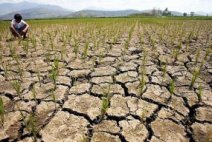Philippines Environmental Issues
One of the earliest notable recognition by the Philippine government of the importance of sustainable development taking into consideration the environment was set out in the 1987 Constitution which stipulates that “The State shall protect and advance the right of the people to a balanced and healthful ecology in accord with the rhythm and harmony of nature.”
In 1991, the Philippines began to address the issue of climate change in its thrust to achieve sustainable development with the formulation of the Philippine Strategy for Sustainable Development. As a result, the country officially adopted the Philippine Agenda 21 which serves asthe nation's blueprint for sustainable development. During the same year, government agencies and the Philippine Network on Climate Change were convened to create the Inter-Agency Committee on Climate Change (IACCC) led by the Environmental Management Bureau of the Department of Environment and Natural Resources (DENR). The Committee aimed at harnessing and synergizing the various activities undertaken by the national government and civil society in response to the crisis posed by growing problem on climate change.
The Philippine commitment to address global environmental issues was further manifested by its support to the United Nations Framework Convention on Climate Change (UNFCCC) ratified on August 2, 1994 and the Kyoto Protocol, which was ratified on November 20, 2003. As a signatory to the UNFCCC, the Philippines expressed adherence to the principles of sustainable development and environmental preservation based on the notion of equity and the unique capabilities of the participating countries. Article 3 of the Convention states that states who have aligned themselves with the mandates set forth “should protect the climate system for the benefit of present and future generations of humankind, on the basis of equity and in accordance with their common but differentiated responsibilities and respective capabilities.” In 2000, the Philippines forwarded to the UNFCCC its Initial National Communication which enumerated the accomplishments of the country in meeting the objectives of the Convention. The report presented the gains made in the fields of greenhouse gas abatement and inventory. Also noted were significant achievements in strengthening institutions and processes in relation to the mitigation, prevention and adaptation initiatives in the country. Further, in adherence to the Kyoto Protocol, the Philippines adopted the Clean Development Mechanism.
Also, the Philippines passed and implemented national measures that advance the international community’s agenda pertaining to environmental preservation. Some of the major legislations enacted were R.A. 8749 (Clean Air Act of 1999) that moves for an effective air quality management program that will mitigate the worsening problem of air pollution in the country, R.A. 8435 (Agriculture and Fisheries Modernization Act of 1997) that establishes that the Department of Agriculture together with other appropriate agencies, should into account climate change, weather disturbances and annual productivity cycles in order to forecast and formulate appropriate agricultural and fisheries programs, R.A. 9003 (Solid Waste Management Act of 2000) that aimed at providing a comprehensive solution to the country’s garbage problem and R.A. 9275 (Philippine Clean Water Act of 2004) that moves for a comprehensive water quality management scheme.
In 2007, Administrative Order 171 was issued to create a Presidential Task Force on Climate Change (PTFCC). The task force is mandated to address and mitigate the impact of climate change in the Philippines, paying special attention to adaptation, mitigation and technological solutions. In particular, the task force focuses on improving compliance to air emission standards and acts to combat deforestation and environmental degradation.
More recently, R.A. 9729 (Climate Change Act of 2009) which aims to systematically integrate the concept of climate change in the policy formulation and development plans of all government agencies and units, to the end that the government will be prepared for the impact of climate change was enacted also creating the Philippine Climate Change Commission (PCCC).
The PCCC, an independent and autonomous body attached to the Office of the President, shall be the sole policy making body of the government to coordinate, monitor and evaluate the programs and action plans relating to climate change. The PCCC has drafted the which is committed towards ensuring and strengthening the adaptation of our natural ecosystems and human communities to climate change.










